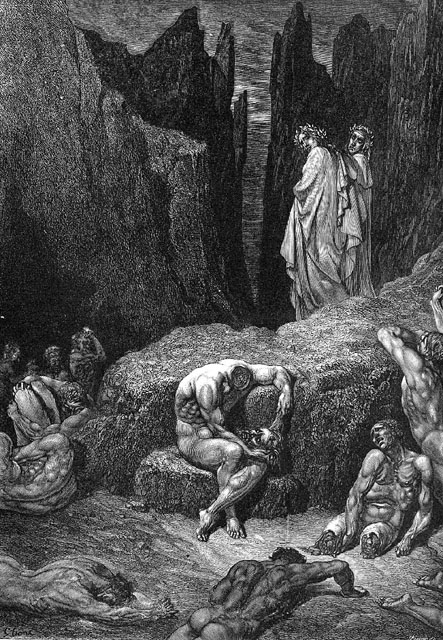
Study Guide for Dante's Divine Comedy
Introduction
to Dante (PowerPoint Presentation)
Plan
of Dante's Comedy
The
Seven Deadly Sins
The
Summa Theologica
of St. Thomas Aquinas
Internet resources
Discussion Questions
Inferno, Cantos 1-4
- Compare Canto 1 to the opening of the Iliad or the Aeneid.
How is it different?
- Compare Dante's journey to the journeys taken by characters in Gilgamesh,
the Odyssey, the Aeneid, and Augustine's Confessions.
How does Dante's appearance
as the central character in the poem make it a different kind of epic?
- Dante encounters a leopard, a lion, and a she-wolf in Canto
1.
What
do you think these beasts symbolize, if anything? Which animal
seems to pose the
greatest problem for Dante?
- What is the role of classical literature and culture in the Inferno?
Why
does Dante have a pagan, Vergil, guide him through Hell, and not a
Christian,
like St. Paul or St. Augustine (who certainly has actual experience
with many of the
sins described in the poem)?
- Who are the women discussed in Canto 2? What is their
historical
or symbolic significance? What is their function in the poem?
- The "neutral angels" (Canto 3) are the product of Dante's poetic
imagination, not
orthodox Christian theology. Why do you think he created them?
- Compare Dante's Underworld to Vergil's Underworld. How is
Dante's
Charon different from Vergil's Charon in Aeneid 6?
- What kind of souls are in Limbo? (Canto 4) What is their
defect (difetto)?
Inferno, Cantos 5-6, 10, 13
- Why do you think Dante makes lust a lesser sin than
gluttony?
(NB: the
sins encountered at the top of the slope are less horrible or offensive
than the
ones at the bottom, and the ones in between are arranged in a
corresponding
hierarchy from one to the other.)
- Paolo and Francesca (Canto 5) are some of the most attractive
sinners
in Hell.
What does Dante do, in a very short space, to make them real to
us?
Why do you think he makes them so sympathetic (they are, after all,
sinners)?
- What is the political theme of Canto 6? How does it relate
to
Dante's
own political experiences?
- Look up "epicurean" in a good dictionary. What kind of sin
is
this?
- Describe the relationship between Farinata and Cavalcante.
What
do
you learn about Florentine politics from the exchange between Farinata
and Dante?
- Why are the Violent against Themselves (suicides) punished the
way they
are? Remember that in Dante's system the sin itself is a form of
punishment.
- Does Pier della Vigne use language in a way that seems peculiar
to
you?
What does his manner of speaking tell you about him as a person?
Inferno, Cantos 14-15, 21-22
- Who is Brunetto Latini and what is his message to Dante?
- How does Dante depict the Grafters (or "barrators" in the Durling
translation) in cantos 21-22? What kind of people are they?
What kinds of names do the demons in charge of them have? Is their sin
more immediate to modern readers than others discussed by Dante?
How do the Grafters affect Dante?
Inferno, Cantos 26-27
- How is Dante's Ulysses different from Homer's Odysseus?
- Guido da Montefeltro is guilty of the same sin as Ulysses--but
how is
he
a different kind of person?
Inferno, Cantos 32-34
- What sin is punished in the lowest level of Hell? Why do
you
think
Dante's considers this to be the worst sin? How are these sinners
punished?
- Why does the lowest part of Hell look like? Does the
landscape
surprise
you? What did you expect? How is it an appropriate place
for
punishing the sinners who are found here?
- Ugolino is one of the last sinners examined in detail in the Inferno.
What kind of commentary on extreme evil is Dante making in his
depiction
of Ugolino? What does Dante's description of Ugolino contribute
to
the poem's political theme?
- What does Dante's Lucifer look like? How is he placed at
the
bottom of the
slope? Is there anything about Dante's Lucifer that surprises you?
Purgatorio Cantos 30-31
- Why does Vergil vanish? When Dante weeps at the loss of
Vergil,
what
does Beatrice say to him?
- What are the three Virtues Dante encounters and what do they help
him
achieve?
Paradiso Cantos 3, 31-33
- What kinds of things is Piccarda eager to discuss? What
subjects
is she more modest about?
- What is the final simile of the poem, and what does it suggest
about
Dante's
poetic project?

